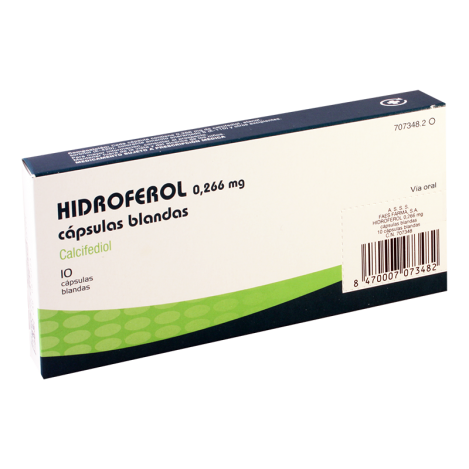
Hidroferol 0.266mg #10caps
Share:
Hidroferol 0.266 mg soft capsules
Calcifediol
Read all of this leaflet carefully before you start taking this medicine because it contains important information for you.
- Keep this leaflet. You may need to read it again.
- If you have any further questions, ask your doctor or pharmacist or nurse.
- This medicine has been prescribed for you only. Do not pass it on to others. It may harm them, even if their signs of illness are the same as yours.
- If you get any side effects, talk to your doctor or pharmacist or nurse. This includes possible side effects not listed in this leaflet. See Section 4.
What is in this leaflet
- What Hidroferol is and what it is used for
- Before you need to know before you take Hidroferol
- How to take Hidroferol
- Possible side effects
- How to store Hidroferol
- Contents of the pack and further information
1. What Hidroferol is and what it is used for
It contains a form of vitamin D, calcifediol, which is used to treat vitamin D deficiency and derived problems, when you need to start with high doses or spaced administration in the time is required. Vitamin D is involved in the human body, among others, to increase the calcium absorption.
Hidroferol is used:
In adults:
In the treatment of vitamin D deficiency, in cases where initial administration of high doses is required or administration spaced in time is desirable, as in the following situations:
- For supportive treatment of osteoporosis
- In patients with malabsorption syndrome (difficulty to absorb nutrients)
- Osteodystrophy (bone problems) or lack of calcium in patients with kidney failure - Bone problems caused by corticosteroid drugs (anti-inflammatory used in various diseases).
2. Before you need to know before you take Hidroferol
Do not take Hidroferol:
- If you are allergic to calcifediol or any of the other ingredients of this medicine (listed in section 6).
- If you suffer from hypercalcaemia (calcium levels in the blood >10.5 mg/dl) or hypercalciuria (high calcium levels in the urine).
- If you suffer from calcium stones formation.
- If you have been diagnosed with hypervitaminosis D (excess of vitamin D in the organism).
Warnings and precautions
Talk to your doctor or pharmacists before taking Hidroferol.
- You should not exceed the recommended daily intake of vitamin D supplements, like this medicine, because it may result in poisoning (see section 3, paragraph If you take more Hidroferol than you should).
- While you are taking this medicine or before you start, your doctor may tell you to take blood or urine tests to check levels of calcium, phosphorus and other parameters.
- Some patients with liver disease may have minor effect of this medicine.
- Patients with kidney disease require special care and must be specially monitored by the doctor, conducting regular analysis.
- Patients with heart disease require special care and must be frequently monitored by the doctor to control blood calcium, especially those receiving treatment with cardiac glycosides (see in this section, paragraph Taking Hidroferol with other drugs).
- If you have hypoparathyroidism (insufficient function of the parathyroid hormone) this drug may be less active.
- If you have a tendency to get calcium-containing kidney stones, your doctor should monitor your blood calcium levels.
- Patients with prolonged immobilization may need lower doses of this medication.
- Some bowel diseases can reduce the ability to absorb vitamin D (such as diseases in which frequent diarrhea occurs).
- Patients with sarcoidosis (disease with nodules, usually on the skin), tuberculosis or other diseases with nodules should be especially careful with this medication, as they have more risk of side effects at lower doses than the recommended ones. Periodic analyses should be performed to control the levels of calcium in blood and urine.
- Your doctor must inform you and your family and/or caregivers of the importance of taking the drug at the doses indicated by him/her and of recommendations about your diet and calcium supplements intake to avoid overdosing.
- Interference with laboratory tests: If you are going to have any diagnostic test done (including blood, urine, skin tests using allergen, etc ...) inform the doctor that you are taking this medication because it may influence the results. For example, in a cholesterol test.
Children and adolescents
For use in children and adolescents, other presentations with lower dose strength are recommended.
Elderly
Elderly patients generally have greater needs for vitamin D because the skin is less able to convert vitamin D into its active forms or because of less exposure to the sun, among other reasons. They should take the drug under medical supervision.
Other medicines and Hidroferol
Tell your doctor or pharmacist if you are taking, have recently taken or might take any other medicines.
Some medicines can alter the way this medicine work. On the other hand, Hidroferol or calcifediol, its active ingredient can affect the effectiveness of other drugs taken simultaneously. Therefore, they may interact with the following drugs:
- Medicines used to treat epilepsy (such as phenytoin, phenobarbital and primidone) and other enzyme-inducing drugs (favoring the reduction of Hidroferol efect).
- Heart medicines and/or hypertension and cardiac glycosides, thiazide diuretics or verapamil.
- Cholestyramine, colestipol (for cholesterol), orlistat (for obesity). Intake of these drugs and calcifediol should be separated at least 2 hours.
- Mineral oil or paraffin (laxatives): Using another type of laxative or separating intake of both drugs is recommended.
- Some antibiotics (such as penicillin, neomycin and chloramphenicol).
- Magnesium salts.
- Other products with Vitamin D.
- Calcium supplements.
- Corticosteroids (anti-inflammatory drugs).
Hidroferol with food and drinks
Some are supplemented with vitamin D. This should be taken into account since the effects could be added to the effects of this medicine and therefore be excessive.
Pregnancy, breast-feeding and fertility
If you are pregnant or breast-feeding, think you may be pregnant or are planning to have a baby, ask your doctor or pharmacist for advice before taking this medicine.
Do not take this medicine during pregnancy.
Do not take this medicine while breastfeeding your baby.
Driving and using machines
Hidroferol has no or negligible influence on the ability to drive and use machines.
Hidroferol contains ethanol, sorbitol (E-420) and sunset yellow (E-110).
This medicine contains 1% ethanol (alcohol), this small amount corresponds to 4.98 mg/capsule.
This medicine contains sorbitol. If you have been told by your doctor that you have an intolerance to some sugars, contact your doctor before taking this medicinal product.
This medicine may cause allergic reactions because it contains sunset yellow (E-110). It can cause asthma, especially in patients allergic to acetylsalicylic acid.
3. How to take Hidroferol
Always take this medicine exactly as your doctor or pharmacist has told you. Check with your doctor or pharmacist if you are not sure.
Do not take more medicine or more often than prescribed by your doctor (weekly, biweekly or monthly). If you do, the risk of overdose increases.
Doses vary according to the person and indications. Your doctor should monitor your calcium and vitamin D levels periodically, usually before starting the treatment and at 3 months after.
Depending on the indication, doses will be generally reduced or more spaced in time when symptoms improve or vitamin D deficiency has been overcome.
Recommended doses are as follows:
Adults
The recommended dose is one capsule (0.266 mg of calcifediol) once a month.
- Vitamin D insufficiency: the administration of one capsule (0.266 mg of calcifediol) monthly for 2 months is recommended.
- Vitamin D deficiency: the initial administration of one capsule (0.266 mg of calcifediol) monthly for 4 months is recommended.
- As supportive treatment of osteoporosis in patients with vitamin D deficiency the administration of one capsule (0.266 mg of calcifediol) is recommended monthly for 3-4 months.
There are populations at high risk of vitamin D deficiency which may need to take higher doses or for longer periods, provided the doctor considers it appropriate, depending on the degree of deficiency after the corresponding blood tests and subsequent regular controls of such levels:
- Renal osteodystrophy: taking a capsule (0.266 mg of calcifediol) weekly or bi-weekly is recommended.
- Bone problems induced by corticosteroid drugs: taking a capsule (0.266 mg of calcifediol) per month is recommended.
- In patients with higher vitamin D deficiencies or malabsorption the initial dose should be repeated a week starting the treatment (one capsule), followed by one capsule once a month for four months, controlling the plasma concentration of 25-OH-cholecalciferol. Based on these levels an increase in dose or frequency of administration may be required. Once the value is stabilized within the range the therapy should be discontinued or intakes spaced.
For oral use
If you feel that the effect of this medicine is too strong or too weak, please contact your doctor or pharmacist.
If you take more Hidroferol than you should
If you take more of this medicine than the dose prescribed by your doctor (overdose) and/or for a long time, hypercalcemia (high blood calcium levels) and phosphates in urine and blood may appear, possibly leading to kidney failure. Some symptoms of toxicity can appear early and others later on. Initial symptoms include: weakness, fatigue, headache, loss of appetite, dry mouth, digestive disorders such as vomiting, abdominal cramps, constipation or diarrhea, increased thirst; increased urination, muscle pain. Some symptoms that may occur later on are: itching, weight loss, stunted growth in children, kidney disorders, intolerance to sunlight, conjunctivitis, increased cholesterol, transaminases, inflammation of the pancreas, calcification (calcium salts deposits) in blood vessels and other tissues such as tendons and muscles, increased blood pressure, mental disorders, irregular heartbeat. The symptoms of overdose usually improve or disappear when treatment is stopped, but if intoxication is severe kidney or heart failure can occur.
If you forget to take Hidroferol
Do not take a double dose to make up for a forgotten capsule.
Take the missed dose as soon as possible; then back to your regular dosing schedule.
If you stop taking Hidroferol
If you have any further questions on the use of this medicine, ask your doctor or pharmacist or nurse.
4. Possible side effects
Like all medicines, this medicine can cause side effects, although not everybody gets them.
Side effects are in general uncommon (may affect up to 1 in 100 people) if the doses are adjusted to the recommendations. However, significant adverse effects can occur in case of excessive or more prolonged treatment than prescribed by your doctor, which may cause hypercalcemia (increased levels of calcium in blood).
The following side effects can occur:
Nausea, vomiting, dry mouth, constipation, taste alterations with a metallic taste, abdominal cramps (cramping sensation in the gut), anorexia (loss of appetite).
In case of moderate hypercalcemia (increased calcium levels) weakness, fatigue, drowsiness, headache (headache) and irritability may occur.
In cases of hypercalcemia arrhythmia (heart rhythm disorders) may appear.
In case of hypercalcemia bone and muscle pain and appearance of calcifications (calcium deposits) in soft tissues may occur. Also nephrocalcinosis (formation of calcium deposits in the kidney), impairment of renal function with polyuria (increased frequency of urination), polydipsia (increased thirst), nocturia (night urine) and proteinuria (proteins in urine).
In rare cases (may affect up to 1 in 1000 people), at very high doses photophobia (intolerance of the eyes to light) and conjunctivitis with calcifications (calcium deposits) on the cornea may occur.
Other adverse effects include: rhinorrhea (runny nose), itching, hyperthermia (fever) and decreased libido (sexual desire). Pancreatitis (inflammation of the pancreas). Increase of urea nitrogen in blood, albuminuria (albumin in the urine), hypercholesterolaemia (increased cholesterol in the blood) and hypercalcemia (increased calcium in blood).
With high levels of blood calcium, increased transaminase (SGOT and SGPT) can occur.
Reporting of side effects
If you get any side effects, talk to your doctor, pharmacist or nurse. This includes any possible side effects not listed in this leaflet. You can also report side effects directly via the national reporting system. By reporting side effects you can help provide more information on the safety of this medicine.
5. How to store Hidroferol
Keep this medicine out of the sight and reach of children.
Do not use this medicine after the expiry date which is stated on the carton after EXP. The expiry date refers to the last day of that month.
This medicinal product does not require any special storage conditions. Do not refrigerate.
Do not throw away any medicines via wastewater or household waste. Ask your pharmacist how to throw away medicines you no longer use. These measures will help protect the environment
6. Contents of the pack and further information
What Hidroferol contains
- The active substance is calcifediol. Each capsule contains 0.266 mg of calcifediol (equivalent to 15,960 IU of vitamin D).
- The other ingredients are: anhydrous ethanol, medium chain triglycerides and the components of the capsule include: gelatin, glycerol, sorbitol (E-420), titanium dioxide (E171) and sunset yellow (E110).
What Hidroferol looks like and content of the pack
Hidroferol are orange, oval soft gelatine capsules containing a clear, low viscous and free from particles liquid and packed in Al-Al blisters or PVC / PVDC-Al blisters containing 5 or 10 capsules.
Marketing Authorisation Holder and Manufacturer
FAES FARMA S.A.
Máximo Aguirre, 14
48940 Leioa (Bizkaia)
SPAIN
Tbilisi (145 Pharmacy)
236-57-55
236-21-78
236-34-51
264-13-02
Region (186 Pharmacy)
(+995 349) 22-28-83
0322 506506 (3456)
33-71
(+995 353) 22-21-62
2-506-506 (3373)
0322506506 (3386)
2-506-506 (3480)
(+995 350) 27-34-93
(+995 350) 27-00-47
2-506-506 (3204)
2-506-506 (3205)
0322506506 (3208)
2-506-506 (3458)
(+995 354) 22-11-21
(+995 354) 22-39-00
(+995 351) 24-34-78
2-506-506 (3392)
577 006 790
(+995 352) 22-14-53
0322 900 800 (3243)
0322 506 506(3247)
0322506506 (3244)
(+995 355) 24-39-03
2-506-506 (3485)
0322506506 (3489)
0322 506056 (3454)
2-506-506 (3209)
0322 900 800 (3486)
2-506-506 (3487)
2-506-506 (3488)
2-506-506 (3801)
0322 506 506(3511)
2-506-506 (3516)
(+995 372) 22-34-36
(+995 360) 22 23 15
2-506-506 (3519)
2-506-506(3524)
2-506-506 (3481)
2-506-506 (3207)
5049
0322 506 506(3502)
(+995 357) 22-24-05
(0322)506-506 (3504)
(+995 341) 22-12-03
(+995 341) 24-16-90
(+995 341) 22-03-64
577 00 67 38
2-506-506 (3256)
0322 506 506 (3257)
(3393)
(3258)
3259
(+995 370) 27-96-47
(+995 370) 27-96-46
(+995 370) 27-99-65
(+995 370) 27-09-33
0322 506 506 (3225)
2 506-506 (3226)
(+995 371) 22-46-66
(+995 371) 22-24-55
(+995 369) 23-16-94
0322506506 (3231)
(+995 368) 24-61-92
2-506-506 (3362)
2-506-506 (3468)
(+995 362) 22-37-00
(+995 362) 22-28-30
2-30-86-13
(+995 365) 22-13-32
(+995 365) 22-12-02
2-506-506 (3463)
2-506-506 (3465)
(+995 322) 36-84-37
(+995 367) 22-33-31
2-506-506 (3342)
(+995 361) 22–00–51
(+995 434) 22-24-82
2-506-506 (3455)
(+995 492) 25-16-28
(+995 492) 25-71-70
(+995 492) 25-28-61
(+995 492) 24-22-39
2-506-506 (3215)
2-506-506 (3216)
0322 506 506 (3217)
(+995 491) 22-15-90
0322506506 (3469)
(+995 411) 22-12-85
(+995 411) 22-10-26
(+995 435) 22-23-73
(+995 577) 00–67–79
(+995 435) 22-50-15
(+995 497) 22-20-41
(+995 431) 24-80-69
0322 506 506(3702)
(+995 431) 24-31-77
(+995 431) 27-29-48
(+995 431) 26-47-06
(+995 431) 27-12-88
577006757
(+995 431) 27-09-91
(+995 431) 26-22-01
(+995 431) 27-47-91
(+995 431) 23-44-84
(+995 431) 25-04-03
(+995 431) 26-45-87
(+995 431) 25-08-07
0322 506 506 (3715)
(+995 431) 22-16-22
(+995 431) 24-24-92
(+995 431) 25-21-41
0322 506 506(3719)
2-506-506 (3720)
(+995 431) 24-15-62
577 38-60-52
2-506-506 (3723)
2-506-506 (3724)
0322506506 (3725)
0322506506 (3726)
0322506506 (3276)
(+995 436) 22-24-61
0322506506 (3269)
(+995 479) 25-52-02
0322506506 (3262)
(+995 479) 25-42-20
(+995 479) 25–28–51
(+995 495) 22-14-34
(+995 494) 22-30-34
0322506506 (3278)
(+995 496) 27-52-42
2-506-506 (3422)
(+995 496) 27-68-67
2506506 (3520)
(+995 419) 22-22-97
2-506-506 (3427)
0322506506 (3441)
(+995 422) 22-20-36
(+995 422) 22-29-37
(+995 422) 24-08-05
(+995 422) 24-80-28
2-506-506 (3406)
(+995 422) 22-62-44
(+995 422) 25-59-99
2-506-506 (3409)
577 00 67 14 (3410)
2-506-506 (3411)
(+995 422) 22–36–22
(+995 422) 22–61–13
577 420-562
2-506-506 (3415)
2-506-506 (3416)
2-506-506 (3417)
2-506-506 (3418)
0322 506506 (3420)
0322506506 (3444)
(3445)
(+995 426) 26-72-28
2-506-506 (3442)
(+995 412) 29-11-19
2-506-506 (3467)
2-506-506 (33-01)
(+995 415) 22-10-25
(+995 415) 22-24-66
(+995 415) 22-23-77
214-73-82
2-506-506 (3306)
2506506 (3307)
2-506-506 (3311)
2-506-506 (3312)
0322 506-506 (3313)
2-506-506 (3206)
(+995 413) 27-65-32
(+995 413) 27-74-22
(+995 413) 27-87-23
(+995 493) 22-81-17
(+995 493) 27-55-38
(+995 417) 22-01-05
2-506-506 (3356)
2-506-506 (3521)
2-506-506 (3522)
(+995 414) 22-21-64
2-506-506 (3359)


















